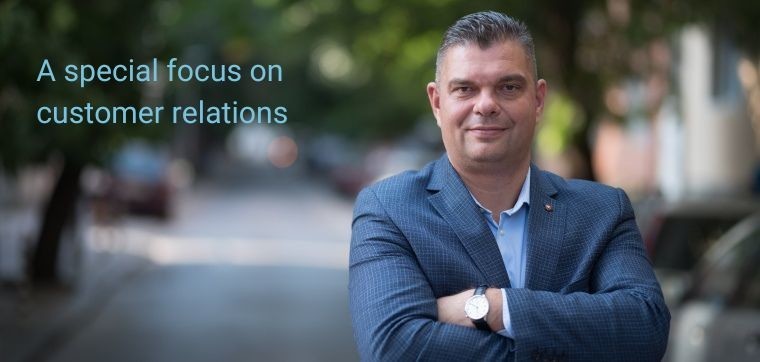Noventiq has been present in the Central and Eastern European region for more than five years. The last period has brought a lot of excitement to the life of the company, which we discussed in our previous article in detail, but, at the same time, there are constant factors, without which growth would be unimaginable. This includes paying special attention to customer relations—this is what we are discussing with Zoltán Mészáros, Vice President of the Central and Eastern European region.
What is the secret to good customer relations?
In our role as consultants and partners, the most important thing is to listen to our customers, and hear them as well, because the two are not the same. We not only listen to their specific requests, but also hear their challenges, ideas and plans as they experience them in their own fields of expertise. At this point, we already begin to think about and build the proposed solution, which this way really serves their interests.
Our experts are in contact with many industries, so they are able to come up with a proposal for each and every customer. Even so, these are not necessarily ready-made solutions. We continuously monitor and summarize the challenges of our customers, so we don’t only offer one-size-fits-all services, but also focus on specific needs.
As an IT service provider, how does Noventiq respond to current industry trends?
On the one hand, we follow the needs of businesses and can respond to them with rapid service development. On the other hand, in addition to regular training, our experts, who have extensive experience, are constantly monitoring trends and service provider developments so they can share first-hand information about them with our customers. This includes delivering the message of new technologies, as well as building up pilot programs that enable our customers to experience how that development can help them. Our customer relations are characterized by constant interaction, as we demonstrate the potential of technologies proactively. This is the driving force behind our ongoing growth.
Noventiq has recently completed a number of acquisitions. What value do these offer for customers?
We examine the market experience and capabilities that can be gained through acquisition from several perspectives, starting with the market in which the given knowledge is focused and in which additional areas we would like to use it. We provide some services locally, while others are on a regional or international level. To assess these, we develop a preliminary plan to see what’s needed to be able to cover that area. At the same time, we are always driven by a single goal, which is to provide every service to our customers at a consistent high quality, and to operate in a coordinated manner across the entire group of companies. Our customers can leverage this knowledge and experience gained globally in their own environment. This is exactly what the motto of Noventiq highlights: global expertise, local outcomes.
What areas should companies focus on now in the field of IT?
In general, security must continue to be a priority. There are still huge differences in the way companies think about cybersecurity, so I think this is a topic we just can’t talk enough about. In addition, optimization has become a standard requirement. This includes both reducing costs and establishing more efficient and transparent business processes. At the same time, companies don’t want to give up the opportunity for growth, which drives them even more towards the cloud. In many cases, the highly scalable services available on a cloud-based infrastructure would require a significant up-front investment to be implemented on-premises. It is also apparent that the vast amount of data generated during daily operations also poses challenges for companies. They would like to be more thoughtful about managing, processing and governing their data estate and enable data-driven decisions that effectively support business development goals. I would also like to mention the potential of using predictive technologies. In many cases companies do not yet have tangible information about them, but at the same time it is worth exploring what benefits can be realized.









